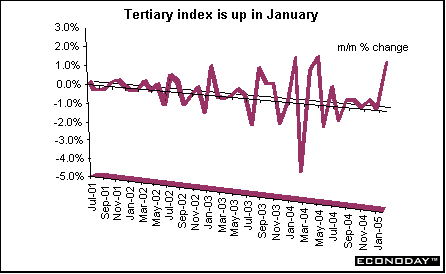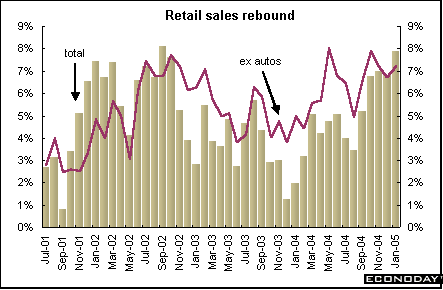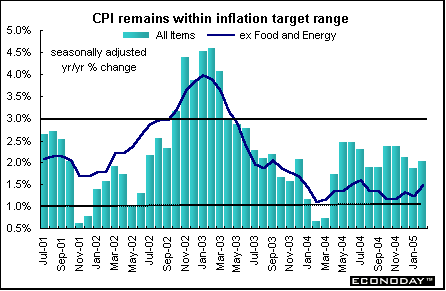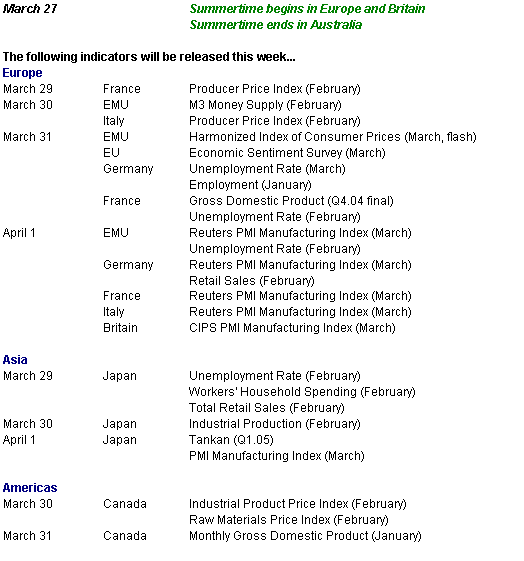
 Blame it on the Fed
Blame it on the Fed
By Anne D. Picker, International Economist, Econoday
Monday, March 28, 2005

Fed addles investors - and markets
Monday and Tuesday last week were marked by investor anticipation of Tuesday's FOMC meeting even if the results seemed a foregone conclusion (a 25-basis-point rate increase to 2.75 percent). The remainder of the week was spent reacting to the Fed's post-meeting statement. In it, the Fed underlined some concerns about inflation even though the word "measured" - the focus of attention prior to the meeting - remained. The specter of a 50-basis-point increase immediately became the topic du jour given that the statement inspired uncertainty about the Fed's next move. And we all know - markets do not like uncertainty! While soothing investor nerves by retaining the key word "measured," the Fed still believes that "inflation expectations remain well contained." It acknowledged though, that inflationary pressures have picked up and insinuated that it may have to be more active to balance upside and downside pressures to inflation and growth. On the week, while no indexes followed here were immune to the downward pressures of Fed worries - only the CAC and DAX managed to end on a positive note prior to the long weekend.

Global Stock Market Recap

Europe and Britain
The CAC and DAX managed to recoup losses from earlier in the week and ended higher. The FTSE barely missed breaking even. Falling business confidence in Germany, losses for heavily-weighted oil stocks and the prospect of even higher U.S. interest rates all conspired to push stocks lower on Wednesday. And although the Fed's 25-basis-point increase to 2.75 percent was widely anticipated, the focus was really on the wording of the post-meeting statement. The Fed had previously said that it will keep the pace of monetary tightening "measured" but now it says it may be forced to signal a more aggressive approach in response to rising inflationary pressures.

European Union finance ministers (Ecofin) finally agreed on new flexible fiscal rules for the EU's Stability and Growth Pact. These, in turn, were agreed to at an EU summit on Tuesday. Under the compromise deal (which was fractious in its making), Germany is able to cite reunification costs as an excuse for breaking the Pact's 3-percent-deficit-as-percent-of-GDP limit even though those costs have been ongoing for about 15 years. EU members with deficits above the pact's limit are now allowed to cite the costs of "the reunification of Europe" as a mitigating factor. Since Germany spends 4 percent of its GDP on transfers to the former communist east, the concession could help German Chancellor Gerhard Schr�der avoid further reprimands under the Pact before next year's general election. Hard line defenders of the stability pact, including the Netherlands and Austria, won assurances that Germany would only be able to invoke the get-out clause if its deficit was "slightly and temporarily" above 3 percent. The Pact was originally agreed to at the insistence of Germany to prevent other countries (such as Italy) from running uncontrollable deficits.
Many EU leaders, including Schr�der, Jacques Chirac of France and Silvio Berlusconi of Italy, have argued for a looser pact, which would give them more freedom to run economic policies without interference from Brussels. Both Germany and France have repeatedly breached the Pact's 3 percent deficit limit. The ECB expressed "serious concern" over plans to ease the deficit rules. The ECB hinted that interest rates might have to rise as a consequence. The Bank said that it remained firmly committed to deliver on its mandate of maintaining price stability. Britain and European business leaders also denounced the revised Pact. In spite of the criticism, Jean-Claude Juncker prime minister of Luxembourg, which is the current holder of the EU presidency, believes the new pact will be credible, putting pressure on EU members to consolidate their budgets during upswings while giving them more room to maneuver in downswings.
Asia/Pacific
It was not a good week in the Asia/Pacific region with the six indexes followed here dropping primarily on U.S. concerns. Markets here were closed when the Fed made its announcement and investors reacted on Wednesday. The Nikkei slumped to a four-week low in the index's biggest one-day drop of the calendar year on fears that U.S. interest rates could rise faster than expected and crimp growth in Japan's principal export market. Exporters such as Honda, NEC and Fuji Photo Film were hit by the sell-off. While the mood eased somewhat on Thursday, unease continued to pervade through the markets - especially before a holiday weekend when most markets would be closed. In Hong Kong, the Monetary Policy Board adopts U.S. monetary policy because of its currency peg to the U.S. dollar. Higher interest rates there were greeted glumly by investors and the Hang Seng dropped for the second consecutive week.

Easing of commodity prices also provoked declines in stocks such as BHP Billiton on concern earnings growth would slow. Many analysts think that current commodities prices are not sustainable making the outlook for mining stocks uncertain. Australian and Canadian equities were particularly affected by the commodity price swing.
Stocks in South Korea were down even though fourth quarter GDP expanded by 0.9 percent. Surging sales to China and the U.S. are prompting a wave of company expansions, which in turn is leading to higher employment. Overseas sales make up about 40 percent of GDP. Domestic demand is also showing signs of revival after a swelling of credit-card debt forced many households over the past two years to cut spending on car and other luxury purchases. One in 13 of the nation's 48 million people were three months or more behind on debt payments at the end of last year according to official figures.
Currencies
The euro dropped below $1.30 on Wednesday after the FOMC pushed the Fed Funds rate to 2.75 percent. The yen dropped as well. There are numerous reasons for this reversal of fortune for the euro.
- There is now a 75-basis-point spread differential between the U.S. and the EMU. This makes investment in the U.S. look more attractive.
- The continuing flow of poor economic data are dampening investors' enthusiasm for stocks, especially in Germany where manufacturing orders declined a revised 3.5 percent in January and the Ifo economic sentiment index sank for the second month.
- The defanging of the Stability and Growth Pact by the EU that makes fiscal imprudence an available option for some governments. The ECB is not pleased - they could be forced to increase interest rates to maintain EMU integrity even though the economy teeters on recession.
- The higher-than-expected reading of U.S. inflation pushed the dollar higher and bolstered speculation that the Fed will abandon its policy of gradual increases and begin raising rates by 50 basis points.

Indicator scoreboard
EMU - January unadjusted merchandise trade balance recorded a deficit of �2.2 billion. This was the first deficit in two years. Unadjusted exports were up 8 percent while imports were up 13 percent when compared with last year. However the seasonally adjusted balance recorded a trade surplus of �3.5 billion. Exports were up 0.2 percent but imports jumped 1.8 percent on the month. On the year, all exports for all major product categories were up with energy products up 18 percent while crude materials were up 11 percent. Manufactured goods were up 8 percent on the year.

January new industrial orders plummeted 5.8 percent but were up 8.5 percent when compared with last year. The decline was largely due to a drop in French aerospace industry orders after sizable jumps in the previous two months according to Eurostat. Data for five of the 12 EMU members were not available and not included in the release, which raises the possibility of a major revision to the data.
Germany - January seasonally and workday adjusted manufacturing orders were revised slightly to a decline of 3.5 percent from the originally reported drop of 3.4 percent. Foreign orders were revised to a decline of 0.4 percent from the originally reported increase of 0.8 percent, while domestic orders were revised to a decline of 6.3 percent from the originally reported decline of 7.1 percent.

March Ifo business sentiment index dropped to 94 from 95.4 in the previous month. Current conditions dropped to 93.3 from 94.5 previously, while future expectations sagged to 94.6 from 96.4. Manufacturing and retail sector sentiment was down, while construction sentiment improved slightly but remained fragile.

France - February seasonally adjusted consumer spending on manufactured goods was down 1 percent but up 3.3 percent when compared with last year. All the main categories were down. Autos were down 0.7 percent as were clothes and textiles. Durables edged down 0.1 percent.

Italy - Fourth quarter unemployment rate remained at 8 percent, the lowest rate since the series began in 1993. The older aged group worked beyond the age of 55 because of pension system reforms, but this was offset by the number of job seekers that dropped out of the labor force.

January seasonally adjusted retail sales were down 0.2 percent and 1.8 percent when compared with last year. Sales for both food and non-food items were down.

Fourth quarter gross domestic product was revised downward to a decline of 0.4 percent from the originally reported 0.3 percent. When compared with the fourth quarter of 2003, GDP growth was revised downward to 0.8 percent from the originally reported 1 percent. Private consumption was up 0.2 percent and 1.1 percent on the year. Government consumption was up 0.2 percent and 0.3 percent on the year. However capital investment sank 1.7 percent but was up 0.5 percent on the year.

Britain - February consumer price index was up 0.3 percent and 1.6 percent when compared with February 2004. The main upward push was from transport prices (up 0.9 percent) which reflected higher airfares and fuel costs. Food and beverages were up 0.7 percent as bad weather disrupted supplies. The Bank of England uses the CPI as a measure of inflation, and it remains comfortably under their current target of 2 percent. Retail price index excluding mortgage interest payments was up 0.4 percent and 2.1 percent on the year.

Final fourth-quarter gross domestic product was up an unrevised 0.7 percent and 2.9 percent when compared with last year. However, household spending was revised to an increase of 0.2 percent from the originally reported increase of 0.4 percent. Government spending was up 0.9 percent while investment was up 0.6 percent.

Asia
Japan - February seasonally adjusted merchandise trade surplus climbed to �915.5 billion. Exports were down 7.5 percent while imports were down 5 percent. On an unadjusted basis, the surplus was �1.1 trillion ($10.36 billion). Exports were up 1.7 percent while imports jumped by 11.3 percent when compared with February 2004. Exports of electrical machinery including electronic parts and devices fell 5.1 percent in February from a year earlier. Exports to the U.S. were up 6.4 percent but were down 2.2 percent to China. Higher oil prices are boosting the value of imported goods. Overseas sales might have also been hurt by the timing of the Lunar New Year holiday, which fell in February this year and in January last year. The shift in the holiday reduced the number of working days in overseas markets including China and Taiwan.

January tertiary index was up 2.2 percent and 2.3 percent when compared with last year. The index reflects activity in 11 service industries, which include utilities, transport, telecommunications, wholesale and retail, finance and insurance, real estate, restaurants and hotels, medical, health care and welfare. The number of sectors covered by the index was increased to 11 from six beginning in April 2004. The all industry index was up 2.4 percent and 1.7 percent on the year. The index combines the activity in the 11 tertiary industries with activity in the construction, agricultural and fisheries industries, the public sector and industrial output. This index is considered a close approximation for gross domestic product growth as measured by industrial and service sector output.

Americas
Canada - January retail sales soared 2 percent after sinking 1.2 percent in December. Sales were up 7.9 percent when compared with January 2004. Excluding autos and parts, retail sales were up 2.4 percent and 7.2 percent on the year. Spending was up in all sectors with sales jumping above 2 percent in five of the eight sectors - general merchandise up 4.9 percent; food & beverage up 3 percent; pharmacies up 2.6 percent; furniture & electronics up 2.5 percent and building supplies up 2.4 percent.

February consumer price index was up 0.4 percent and 2.1 percent when compared with last year. Core CPI excluding food and energy was up 0.3 percent and 1.5 percent on the year. Gasoline prices were up 3.4 percent while women's clothing soared 4.7 percent and men's jumped 4.2 percent. Travel tour prices were up 8.1 percent.

Bottom line
The European Union's Stability and Growth pact is now a paper tiger that has officially lost its teeth. Allowances in assessing solvency will be made for all sorts of reasons - from development aid, attempts to boost employment and pension reforms, to the unification of Europe. It is a bit unclear what the latter means. However, it does provide an excuse for Germany to exclude the "temporary" deficits of its bungled unification 15 years later. Under the new rules, short-term fiscal discipline is likely to fade. But European domestic demand is weak and one country's deficits should not worry its partners as long as the markets believe the EU or the European Central Bank will not finance a bail-out.
The clocks changed on March 27th with Europe and Britain moving to summertime. North America follows on April 3rd. This means that for this week, all European and British indicators will be an hour earlier than usual in the U.S. However, in the southern hemisphere, it is the end of summertime. In Japan, there is no seasonal change of clock, but when the U.S. changes to daylight savings time, Japanese indicators will be an hour later and Australian releases will be two hours later than they were in March. Isn't that clear'
Looking Ahead: March 27 through April 1, 2005



|

